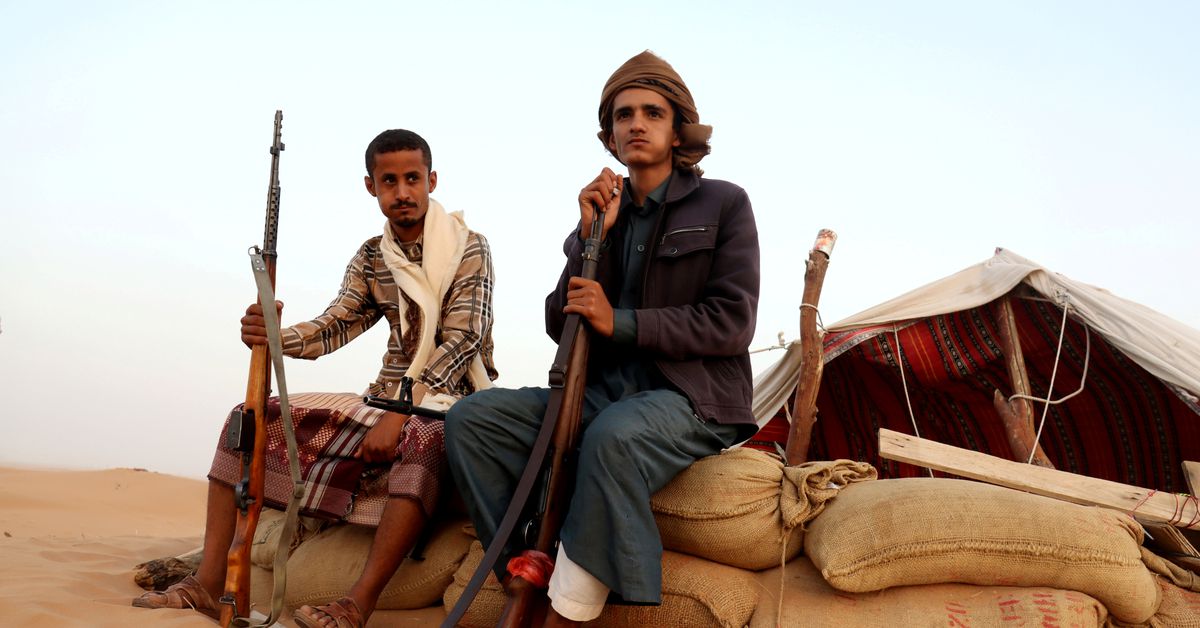Three protesters killed in south Yemen as conflict cripples economy

Armed men loyal to the government forces guard a site near the Safer oil fields in Marib, Yemen September 12, 2021. Picture taken September 12, 2021. REUTERS/Ali Owidha/File Photo
EN, Sept 15 (Reuters) – Three people were killed in violent protests in Aden and other cities in south Yemen over widespread poverty and electricity outages as public services have collapsed within areas controlled by a Saudi-backed alliance.
Two protesters died in Aden and in Mukalla the neighbouring southern Hadhramaut region on Wednesday when violent clashes resumed between demonstrators and security forces, eyewitnesses said. Security forces fired live ammunition to disperse hundreds of young protesters who gathered in the two cities, they said.
One protester was killed and dozens were wounded on Tuesday night in Aden, other residents told Reuters.
Hundreds of stone-throwing protesters clashed with security forces in Aden’s Khour Maksour, Crater and Sheikh Othman districts where demonstrators blocked roads, set fire to government buildings and burned cars in the streets.
“We came out to protest after our life has become impossible. There is no electricity, no water, and salaries can’t buy us anything. We are not going to wait until we die,” said Ahmed Saleh, 34, a protester and government employee.
Other protests were reported in Shabwa and Abyan provinces over the last two days.
South Yemen has been paralysed by a power struggle between the Saudi-backed government and the United Arab Emirates-backed southern separatists. They are nominal allies under a Saudi-led coalition fighting the Iran-aligned Houthi group in the North.
The Southern Transitional Council (STC), fighting for the independence of the South, had seized Aden and other southern areas before Saudi Arabia brokered a power-sharing deal to focus its feuding allies on the battle against the Houthis.
Conflict has crippled public services with frequent power outages that disrupt distribution of water, aid supplies and medical services. Unemployment and spiralling inflation have compounded the misery in a country where most of the 29 million people rely on aid.
PROTESTERS GATHER AGAIN
On Wednesday morning, Aden’s streets were calm but stores and humanitarian organisations’ offices were closed. Remains of charred cars and roadblocks were seen in many parts of the city.
After sunset, protesters started to gather again in Aden’s dark streets in several districts.
An STC spokesman had called for more protests on Wednesday against “the occupation” of the government of President Abd-Rabbu Mansour Hadi.
Other witnesses said dozens of demonstrators stormed Maashiq presidential palace where Hadi’s government is based.
That government said security forces would protect protesters but would not tolerate “destruction of public and private property.”
The military coalition led by Saudi Arabia drove out the Houthi movement from Aden in 2015, but the alliance failed to dislodge the group from Sanaa and other parts of the North, and the multifaceted war has reached a bloody stalemate.
The conflict has created what the United Nations says is the world’s largest humanitarian crisis.
Writing by Aziz El Yaakoubi; Editing by Emelia Sithole-Matarise and Cynthia Osterman
Our Standards: The Thomson Reuters Trust Principles.






